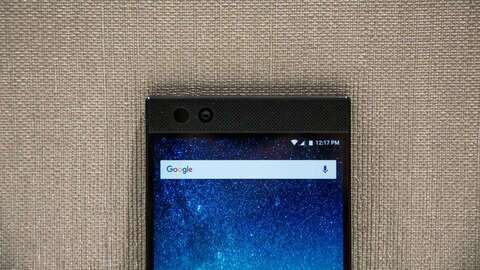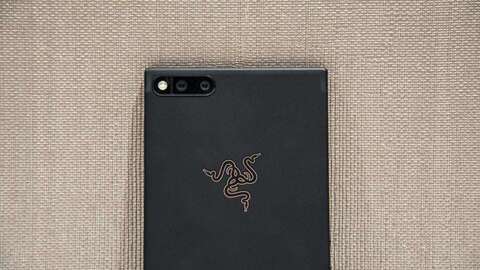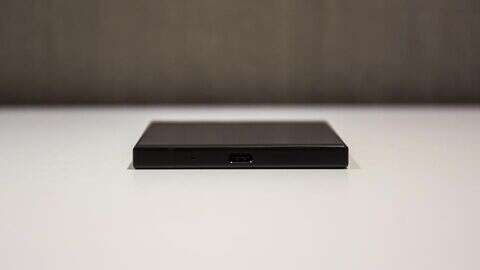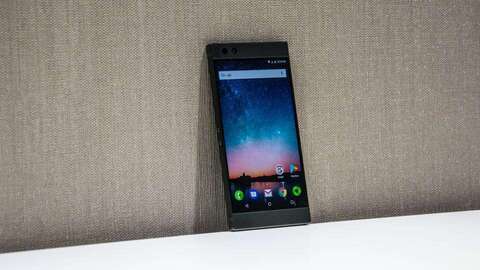Razer Phone review: The smartphone that changes everything
Gaming peripheral outfit Razer is launching a smartphone. Yep, just when you thought the year was winding down and tech reviewers could finally take a breather, this newcomer to the smartphone race has thrown its hat into the ring for the first time: hello, Razer Phone.
And this is no me-too smartphone. Previous leaks may have already softened the blow, but the Razer Phone’s biggest features still warrant your attention. Yes, this already has all the hallmarks of a short-lived cash grab ( Asus Zenfone AR anyone? ), but don’t let that put you off: the Razer Phone has the potential to become one of 2017’s standout handsets.
Razer Phone review: What you need to know
The Razer Phone's core specifications are quietly impressive. There's a Qualcomm Snapdragon 835 processor inside, complete with 8GB of RAM and 64GB of storage that’s expandable by up to 1TB via microSD. Keeping things running is a massive 4,000mAh battery.

On the front is a 5.7in 120Hz 1,440 x 2,560 IGZO LCD display, complete with a pair of 12-megapixel cameras on the back. One is an f/1.7 wide-angle unit; the other is an f/2.6 2x telephoto zoom effort.
Razer Phone review: UK price, release date and competition
The Razer Phone will launch for £699 on 17 November, with preorders starting on 3 November.
In the UK, the Razer Phone is available to purchase SIM-free via the Razer Store , and can be picked up on contract on Three . All 24-month contracts include a £49 upfront cost.
As for competition, we’ve just seen Google’s excellent Pixel 2 launch for £629, complete with the best phone camera on the market. There’s also the flagship-beating OnePlus 5 to contend with at £450, and Samsung’s Galaxy S8 is currently doing the rounds for just £520.
Razer Phone review: Design
At that sort of price, the Razer Phone needs to keep up with the Joneses in all areas. In terms of its design, however, it certainly isn’t the prettiest of 2017’s handsets. Yes, the build quality is of extremely high calibre, as you’d expect from Razer and, yes, the attention to detail is all there.

Its matte, fingerprint-friendly aluminium design does paint an attractive picture, with chamfered edges at the top and bottom of the phone and softly rounded sides. Razer’s three-headed snake logo can also be found on the back, underneath the dual camera arrangement.
But, compared with the narrow bezel, edge-to-edge displays of rivals, the Razer Phone looks a little old hat. And, like Sony’s XZ Premium before it, there are practical problems with the way this phone has been designed. Its sharp corners are raring to tear a hole in your pocket.
That’s a shame, because the Razer Phone isn’t lacking when it comes to those checklist features. You can add a microSD card to expand on its 64GB of built-in storage; there’s a fingerprint reader positioned sensibly on the right-hand side of the phone which does double duties with the power button and there’s a USB-C port at the bottom, supporting the latest Quick Charge 4 standard.
Razer Phone review: Display
It’s the Razer Phone’s adaptive 120Hz refresh-rate screen that really seals the deal, though. Touching, scrolling and playing games on this 5.7in 1,440 x 2,560 IGZO LCD screen is a far more fluid experience than on any other phone available today. It really needs to be played around with to be believed: this bump in refresh rate both looks and feels phenomenal.

And rest assured, most apps support this silky smooth refresh rate, but you aren’t locked at 120Hz if you run into any issues. Should you need to, you can bump the display down to 90Hz or your bog-standard 60Hz.
Razer Phone review: Performance and battery life
Performance is on par with the rest of 2017’s flagships, too. That’s certainly no surprise; inside you’ll find Qualcomm’s Snapdragon 835 powering things, with 8GB of RAM and 64GB of expandable storage. In our benchmarks, yet again, everything was neck and neck.
Graphics performance is a similar story. Running GFXBench’s Manhattan 3.0 test recorded a native resolution onscreen result of 40fps, and an offscreen score of 63fps. It appears that despite the 120Hz display, the Snapdragon 835’s GPU is unable to handle higher framerates at 2K resolution.
The phone has a pretty big battery, at an enormous 4,000mAh in capacity, so it should be a winner on that front as well. The problem is, and this is very much an isolated issue, its 120Hz display is very power hungry.
In our continuous video playback test, with the screen set to our standard 120cd/m2 brightness and flight mode engaged, the Razer Phone reached just 10hrs 37mins before hitting zero. In comparison, that’s a good six hours less than Samsung’s (now cheaper) Galaxy S8. In real-world performance, I managed to scrape a day's use on a single charge with moderate use.
Razer Phone review: Camera
As for the camera, the Razer Phone is equipped with a pair of 12-megapixel rear-facing cameras, complete with phase-detect autofocus. The main f/1.7 aperture camera utilises a wide-angle sensor, while the secondary camera uses a narrower f/2.6 2x telephoto lens, which helps with capturing scenes from further away.

First things first. Outdoors, in brightly lit conditions, the Razer Phone’s rear camera performs splendidly. It captures photographs with crisp details, and rich colours, while exposures are balanced and focus assured.
It’s an accomplished rear snapper, and I particularly like the camera software. There aren’t any pro or manual shooting modes on offer – this is very much a point-and-shoot affair – but the ability to switch between both lenses simply by zooming in is most welcome.
Indoors in low light, it’s perfectly capable, too. Noise levels were kept to a minimum, and the flash helped to pierce through the darkness. Objects did look a touch soft, and weren’t as well-defined as the Pixel 2’s efforts, but this is a superb rear shooter nonetheless.
Razer Phone review: Verdict
Razer seems to have done just enough to make a decent impression with the Razer Phone. It might not be the last word in cutting-edge design but with its unique 120Hz display and a laundry list of high-end components, it really does set itself apart from 2017’s other flagships.
Still, I don’t think the Razer Phone poses any threat to 2017’s host of excellent flagships, but Razer’s first effort is a standout affair, and the gaming firm should be commended for doing something different in a year filled to the brim with samey handsets.
|
Hardware |
|
Processor |
Octa-core 2.35GHz Qualcomm Snapdragon 835 |
|
RAM |
8GB |
|
Screen size |
5.7in |
|
Screen resolution |
2,560 x 1,440 |
|
Screen type |
IGZO |
|
Front camera |
8-megapixel |
|
Rear camera |
Dual 12-megapixel |
|
Flash |
Dual LED |
|
GPS |
Yes |
|
Compass |
Yes |
|
Storage (free) |
64GB |
|
Memory card slot (supplied) |
microSD |
|
Wi-Fi |
802.11ac |
|
Bluetooth |
4.2 |
|
NFC |
Yes |
|
Wireless data |
4G |
|
Dimensions |
158.5 x 77.7 x 8 mm |
|
Weight |
197g |
|
Features |
|
Operating system |
Android 7.1.1 |
|
Battery size |
4,000mAh |